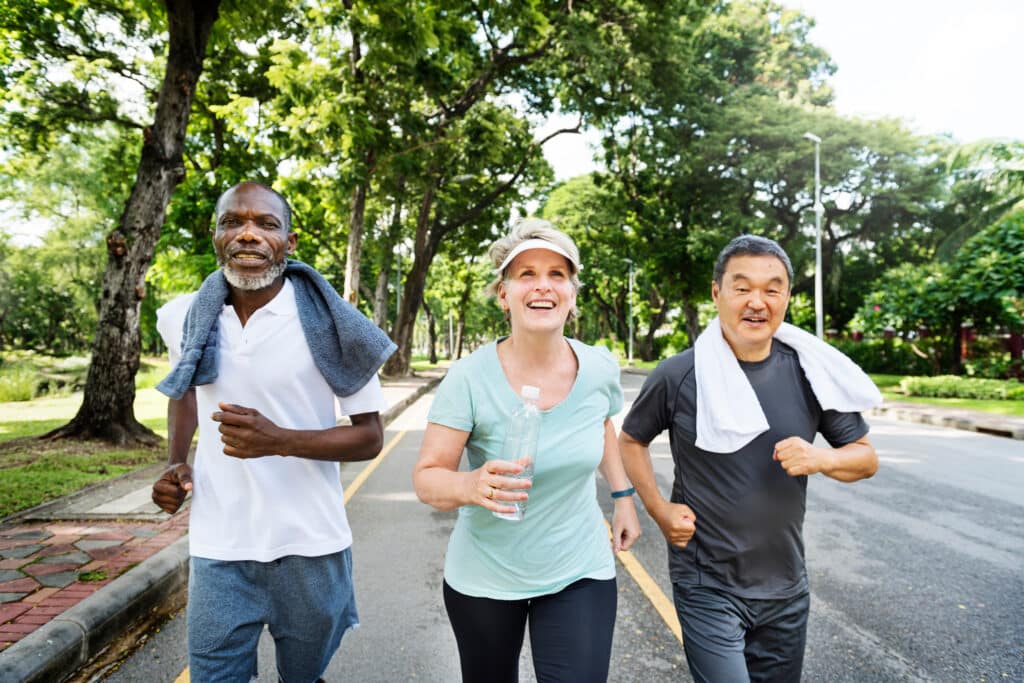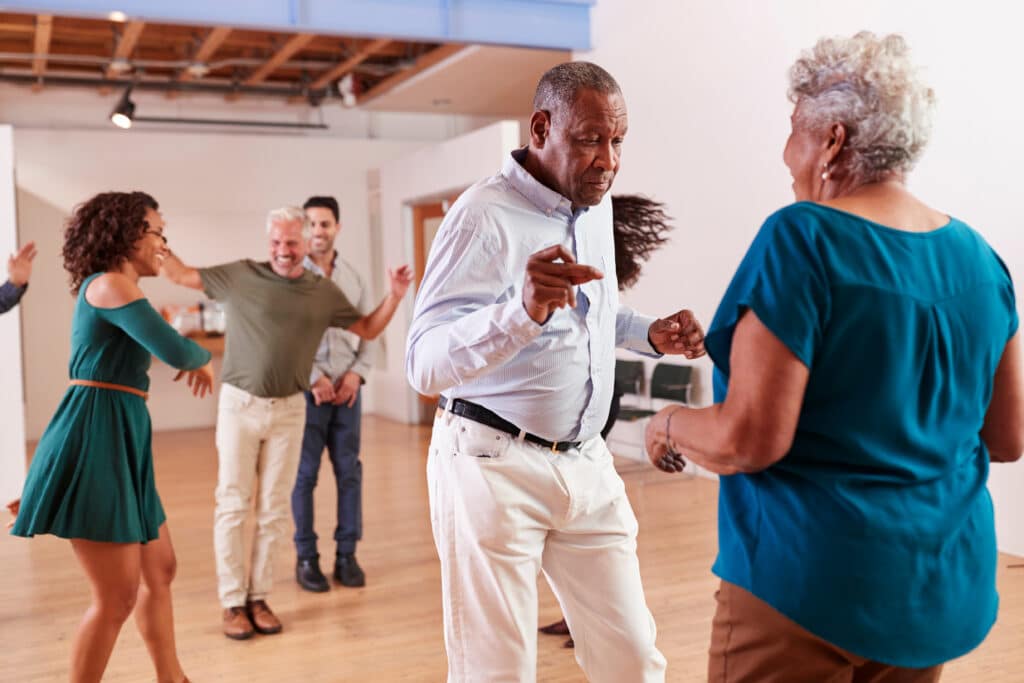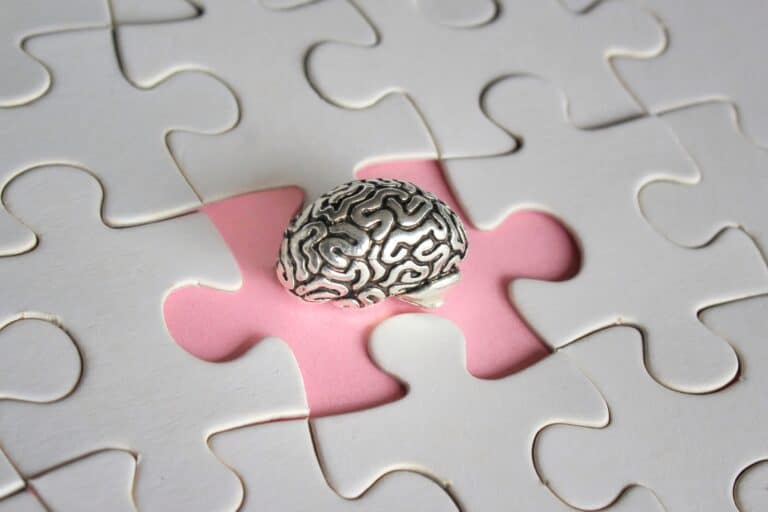The relationship between exercise and brain function is a hot topic these days. Did you know that the kind of exercise you do can not only make you physically stronger but also mentally sharper?
When we think about personalizing our exercise routines, we often consider physical benefits like losing weight or building muscle. But we can also tailor our exercise plans to help our brains too.
Research has found that regular physical activity can help improve how well we function, think, and make decisions. This isn’t limited to just one kind of exercise, either. Whether participating in aerobic workouts, lifting weights, or doing functional fitness, different activities can help boost your cognitive abilities, including memory, attention, and decision-making.
In this article, we’ll explore the best physical exercises to improve brain function and the deeper cognitive benefits of exercise for seniors.
Varieties of Exercise & Their Impact on the Brain

Knowing which exercises can help different parts of your brain can help you create a workout plan that fits not just your physical health goals but your cognitive ones, too. Here are some of the most common—and most studied—varieties of exercise for brain function.
Aerobic Exercise
Aerobic exercises like running, swimming, or cycling get your heart pumping. These exercises increase the flow of blood to your brain, which can improve the function of cognitive processes.
Simple, regular cardio exercise at a reasonably challenging pace can help to boost your energy and your mood while also benefiting your heart and your brain. Even starting with a simple 30-minute brisk walk or jog daily can make a difference over time.
Resistance Training
Weightlifting and other resistance training exercises can also positively affect your brain. Research has shown that these workouts can improve memory and executive function, which are the mental skills that help us get things done.
If you want to reap these cognitive benefits, consider adding weightlifting or bodyweight exercises to your routine several times a week. And as always, if you don’t know where to start, talk to your physical therapist.
Flexibility Training
Flexibility training exercises, like stretching, yoga, or Pilates, are great for maintaining joint mobility and preventing injuries.
While these exercises might not directly impact cognitive abilities, they support brain health by improving overall physical well-being in the many activities that you enjoy. Including flexibility routines in your workout schedule can help maintain your cognitive function by allowing you to prevent injuries to stay active.
Mind-Body Exercises
Mind-body exercises like qi gong, tai chi, and mindfulness meditation are designed to simultaneously improve physical movement and mental awareness.
These exercises can help improve balance, coordination, and concentration while also working as potent stress reducer. Regularly practicing mind-body exercises can help maintain and enhance your cognitive health.
Cognitive Functions Influenced by Exercise

Cognitive function can mean a lot of things. Here are some of the primary categories of cognitive improvement that can be boosted by adding exercise to your life.
Attention and Processing Speed
Regular physical exercise can boost your attention and speed up how quickly you process information. Studies have shown that individuals who regularly participate in aerobic and resistance exercises can improve these cognitive abilities for better general day-to-day activities like engaging in complex tasks like word games and reading or enjoying a stimulating conversation with a friend.
Memory
Research has found that aerobic exercise can enhance memory performance. Both short-term and long-term memory can benefit from regular physical activity, with meta-analysis suggesting that different types of exercise, such as walking or dancing, may influence memory function. Try incorporating various aerobic exercises into your routine to support your memory ability.
Executive Functions
Executive functions refer to various mental processes that help us plan, focus attention, remember instructions, and juggle multiple tasks.
High-intensity training exercises with a vigorous but balanced mix of strength, complexity, and endurance can positively impact these cognitive processes in young and older adults. Incorporate high-intensity interval training (HIIT) or circuit training into your exercise regimen to promote cognitive health for better brain function.
Global Cognitive Function
Global cognitive function refers to an individual’s overall cognitive abilities. Regular exercise can improve global cognition regardless of the specific cognitive domain being assessed, especially when we practice a variety of activities and exercise types.
A systematic review found that older adults who engaged in physical activity, particularly aerobic exercises, experienced improvements in global cognitive function.
Consider combining aerobic and resistance exercises and engaging in mentally stimulating activities for a healthy cognitive boost in the rest of your daily activities.
Other Factors that Influence the Exercise-Cognition Relationship

The impact of exercise on cognitive functioning can vary depending on different factors like your age, gender, and cognitive status before starting an exercise routine. Each person’s needs will vary depending on these basic developmental factors. For instance, some varieties of exercise may benefit children more than older adults, or vice versa
Gender can play a major role in how exercise impacts cognitive functioning. Because of different hormonal and physiological responses, exercise might affect men and women differently, both in terms of brain function as well as other physiological system responses. Talk to your doctor to determine which types of exercise might be best suited for you and your needs at your specific age.
It should also be noted that if you already display high cognitive performance before exercising regularly, your improvements might be less pronounced than those of someone who starts from a lower baseline.
The Importance of Nutrition
In addition to exercise, nutrition plays a crucial role in brain health. A balanced diet provides the nutrients our brains need to function effectively. For instance, omega-3 fatty acids, commonly found in fish and nuts, are essential for brain health and cognitive function.
Additionally, antioxidants in fruits and vegetables can help protect the brain from oxidative stress, which is linked to cognitive decline. A diet rich in lean protein, whole grains, and various fruits and vegetables can help nourish your body and brain.
While a healthy diet can benefit you in a variety of ways physically and mentally, it’s best to speak to a qualified professional to ensure you are meeting and optimizing your personal nutrition needs.
Exercise for Mental Health
While the benefits of exercise on cognitive functions like memory are well-researched, it’s also helpful to note the impact of physical activity on mental health.
Exercise is proven to reduce symptoms of depression and anxiety by boosting the body’s production of stress-reducing hormones and endorphins. It can also provide a positive redirection of focus, breaking the cycle of negative thoughts often accompanying mental health issues or body image concerns.
Exercise and Learning
The cognitive benefits of exercise are not just limited to memory and executive functions; they also extend to learning. By stimulating neuroplasticity, exercise makes the brain more receptive to learning new skills or absorbing new information more effectively.
So, whether you’re learning a physical skill or picking up a musical instrument, incorporating physical activity into your routine can help accelerate your learning progress.
Exercise and Sleep
Exercise can also have a significant impact on sleep quality. Regular physical activity can help regulate your sleep cycle and improve sleep quality, enhancing mood and cognitive performance generally.
Studies have shown a strong correlation between good sleep and improved memory, attention, and cognitive abilities. Therefore, by helping you sleep better, exercise indirectly contributes to better cognitive health.
How to Incorporate Exercise into Your Daily Routine

Knowing the cognitive benefits of exercise is one thing, but implementing it into a busy lifestyle can often be challenging. Here are a few tips to help you get started:
- Set realistic goals: You don’t have to run a marathon on your first day. Start small and gradually increase the intensity and duration of your workouts.
- Make it fun: Find an activity that you enjoy doing. It could be dancing, hiking, or a sport. You’re more likely to stick with an exercise routine if you enjoy it.
- Mix it up: Try different exercises to keep your workouts exciting and challenging for different muscle groups.
- Incorporate physical activity into your daily routine: Use the stairs instead of the elevator, or walk or bike to work if possible.
- Find a workout buddy: Exercising with a friend can make the activity more enjoyable, and you can motivate each other to stay consistent.
The cognitive benefits of exercise have been widely studied and confirmed. Make it a point to include some form of physical activity in your daily routine; you’ll reap the physical benefits and enjoy improved cognitive abilities. Remember, it’s never too late to start to improve your health and wellness, both physically and cognitively.
Key Takeaways
- Exercise and Cognition: Regular physical activity improves physical strength and enhances cognitive abilities such as memory, attention, and decision-making. Different types of exercises, including aerobic, resistance, flexibility, and mind-body workouts, all benefit brain function differently.
- Exercise Personalization: When planning exercise routines, consider both physical health goals and cognitive benefits. Understanding which exercises bolster different cognitive functions can create a well-rounded exercise routine that boosts physical and mental well-being.
- Types of Exercise: Each type of exercise has unique benefits. Aerobic exercises like running or swimming enhance thinking and focus. Resistance training can improve memory and executive function, while flexibility training supports overall brain health. Mind-body exercises like tai chi and meditation benefit physical movement and mental awareness.
- Cognitive Functions Influenced: Regular physical activity can improve cognitive functions, including attention, processing speed, memory, executive functions, and overall cognitive abilities.
- Factors Influencing the Exercise-Cognition Relationship: The impact of exercise on cognition varies depending on age, gender, and baseline cognitive status. Future research will continue to explore these relationships and guide more personalized exercise plans.
FAQs
How does exercise improve cognitive abilities in older adults?
Exercise, particularly aerobic exercises, can enhance cognitive function in older adults, even those with mild cognitive impairment. These improvements come from increased blood flow to the brain, promoting the growth and maintenance of neurons and enhancing communication between brain cells.
Which exercises are most effective for brain function?
Aerobic exercises like walking, jogging, swimming, and cycling are great for improving cognitive function. They increase blood flow to the brain, nourishing brain cells with oxygen and promoting neuronal growth.
Are there any downsides to exercise on cognitive performance?
While physical activity generally benefits cognitive performance, overexercising can lead to physical injuries and mental stress, negatively impacting cognitive function. Always listen to your body, and don’t hesitate to consult a healthcare professional if you’re unsure about your exercise levels.
How does exercise impact mental well-being?
Exercise helps improve mental well-being by releasing endorphins, the “feel-good” neurotransmitters. It can enhance mood, self-confidence, social interactions, and even help reduce stress.
What’s the effect of long-term exercise habits on cognitive function?
Long-term exercise habits can improve cognitive function and lower the risk of cognitive decline or dementia in later life. A combination of a healthy lifestyle, including regular exercise, a balanced diet, and mental stimulation, can significantly impact long-term cognitive health.
References
- Iuliano, E., di Cagno, A., Aquino, G., Fiorilli, G., Mignogna, P., Calcagno, G., & Di Costanzo, A. (2015). Effects of different types of physical activity on the cognitive functions and attention in older people: A randomized controlled study. Experimental Gerontology, 70, 105-110. https://doi.org/10.1016/j.exger.2015.07.008
- Levin, O., Netz, Y. & Ziv, G. The beneficial effects of different types of exercise interventions on motor and cognitive functions in older age: a systematic review. Eur Rev Aging Phys Act 14, 20 (2017). https://doi.org/10.1186/s11556-017-0189-z
- Exercise for cognitive brain health in aging: A systematic review for an evaluation of dose Joyce Gomes-Osman, Danylo F. Cabral, Timothy P. Morris, Katalina McInerney, Lawrence P. Cahalin, Tatjana Rundek, Augusto Oliveira, Alvaro Pascual-Leone Neurol Clin Pract Jun 2018, 8 (3) 257-265; DOI: 10.1212/CPJ.0000000000000460
- Ludyga, S., Gerber, M., Pühse, U., Looser, V. N., & Kamijo, K. (2020). Systematic review and meta-analysis investigating moderators of long-term effects of exercise on cognition in healthy individuals. Nature Human Behaviour, 4(6), 603-612. https://doi.org/10.1038/s41562-020-0851-8
- Biazus-Sehn, L. F., Schuch, F. B., Firth, J., & Stigger, F. D. S. (2020). Effects of physical exercise on cognitive function of older adults with mild cognitive impairment: A systematic review and meta-analysis. Archives of Gerontology and Geriatrics, 89, 104048. https://doi.org/10.1016/j.archger.2020.104048
- Lautenschlager NT, Cox KL, Flicker L, et al. Effect of Physical Activity on Cognitive Function in Older Adults at Risk for Alzheimer Disease: A Randomized Trial. JAMA. 2008;300(9):1027–1037. doi:10.1001/jama.300.9.1027
- Ji Z, Feng T, Mei L, Li A, Zhang C. 2019. Influence of acute combined physical and cognitive exercise on cognitive function: an NIRS study. PeerJ 7:e7418 https://doi.org/10.7717/peerj.7418
- Bratman, G. N., Hamilton, J. P., & Daily, G. C. (2012). The impacts of nature experience on human cognitive function and mental health. Annals of the New York Academy of Sciences, 1249(1), 118-136. https://doi.org/10.1111/j.1749-6632.2011.06400.x






